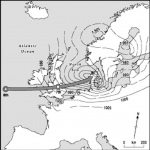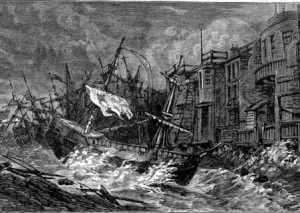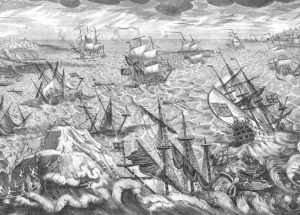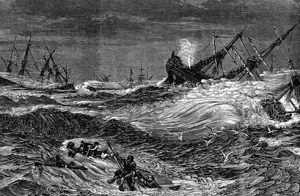
 Back in the 1700s, there were no early warning systems for storms, and I suppose it wouldn’t matter anyway, at least not when it came to the Great Storm of 1703. The storm was a destructive extratropical cyclone that struck central and southern England on November 26, 1703, which would actually have been December 7, by today’s calendar. You see the dates all changed with the adoption of the Gregorian calendar, which was originally developed in 1582, but not adopted by England until 1752. The storm brought with it high winds topping 80 miles per hour, which may not seem so extreme on dry land, but over water, it’s devastating. In fact, the wind was so bad, that it actually blew 2,000 chimney stacks over in London. It also blew over 4,000 oak trees down in New Forest. The winds blew ships hundreds of miles off course, and over 1,000 seamen lost their lives on the Goodwin Sands alone.
Back in the 1700s, there were no early warning systems for storms, and I suppose it wouldn’t matter anyway, at least not when it came to the Great Storm of 1703. The storm was a destructive extratropical cyclone that struck central and southern England on November 26, 1703, which would actually have been December 7, by today’s calendar. You see the dates all changed with the adoption of the Gregorian calendar, which was originally developed in 1582, but not adopted by England until 1752. The storm brought with it high winds topping 80 miles per hour, which may not seem so extreme on dry land, but over water, it’s devastating. In fact, the wind was so bad, that it actually blew 2,000 chimney stacks over in London. It also blew over 4,000 oak trees down in New Forest. The winds blew ships hundreds of miles off course, and over 1,000 seamen lost their lives on the Goodwin Sands alone.
London suffered extensive damage. The lead roofing was blown off Westminster Abbey and Queen Anne had to seek shelter in a cellar at Saint James’s Palace to avoid collapsing chimneys and part of the roof. About 700 ships were heaped together in the Pool of London, which is the section of the Thames River downstream from the London Bridge. The ship HMS Vanguard was wrecked at Chatham. Admiral Sir Cloudesley Shovell’s HMS Association was blown from Harwich to Gothenburg in Sweden before it could make its way back to England. Pinnacles were blown from the top of King’s College Chapel, in Cambridge. At sea, many ships were wrecked, some of which were returning from helping Archduke Charles, the claimed King of Spain, fight the French in the War of the Spanish Succession. These ships included HMS Stirling Castle, HMS Northumberland, HMS Mary and HMS Restoration, with about 1,500 seamen killed particularly on the Goodwin Sands. Between 8,000 and 15,000 lives were lost overall.
The Church of England declared that the vicious storm was God’s vengeance for the sins of the nation. Maybe this is where the 
 rediculous saying, “act of God” was coined. In fact, Daniel Defoe thought it was a divine punishment for poor performance against Catholic armies in the War of the Spanish Succession. That makes the whole statement even more ridiculous. I suppose people have to explain away these wild occurrences somehow, and since they didn’t have the science to explain the storm, they blamed God for it.
rediculous saying, “act of God” was coined. In fact, Daniel Defoe thought it was a divine punishment for poor performance against Catholic armies in the War of the Spanish Succession. That makes the whole statement even more ridiculous. I suppose people have to explain away these wild occurrences somehow, and since they didn’t have the science to explain the storm, they blamed God for it.


Leave a Reply